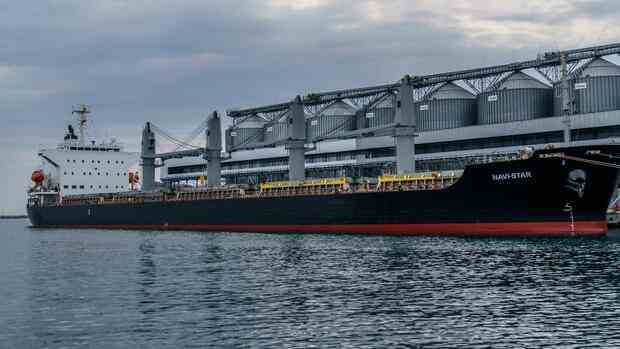Riga, Istanbul The situation in the port city of Odessa is difficult after Russian attacks on the Ukrainian power grid – and yet Turkey and Russia are talking about expanding the so-called grain corridor to other products. From Ukraine’s point of view, it seems illogical to even negotiate with Moscow in view of the Russian attacks. Nevertheless, everyone involved has an interest in cooperating – even if there are no signs of easing the war situation.
The Russian offer to talk about expanding the trade corridor across the Black Sea right now during the bombing is both perfidious and logical from Moscow’s point of view. At the same time, Russian head of state Vladimir Putin is demanding that trade restrictions and embargoes on Russian export products, including steel, be lifted. In this way, Russia would generate income apart from oil exports.
If Ukraine agrees to expanding the trade corridor, it could demand that attacks on port cities be avoided in the future. Due to attacks by the Russian army on Ukrainian infrastructure, especially the energy supply, the port of Odessa was temporarily out of service. Russian troops attacked Odessa on Saturday night with Iranian combat drones, causing the city and the entire surrounding area to lose power.
However, port operations resumed on Monday morning. Ukraine’s largest port is essential for the grain agreement to work – and also for the country’s economic survival.
Top jobs of the day
Find the best jobs now and
be notified by email.
Like Russia, Ukraine is one of the most important grain exporters in the world. Agriculture accounts for about 20 percent of Ukraine’s gross domestic product (GDP) and 40 percent of exports. The Ukrainian economy, badly damaged by the war, is therefore dependent on an agreement. Experts from the Vienna Institute for International Economic Studies are forecasting a 33 percent drop in Ukrainian GDP for the current year.
The agricultural sector is an important part of the Ukrainian economy.
(Photo: Anadolu Agency/Getty Images)
There are already so-called EU solidarity channels so that goods can increasingly be exported over land instead of by ship. Ukraine has already exported around 17 million tons of food to the EU via these routes since it went into operation in May. In June, the EU and Kiev also agreed to suspend all import tariffs on Ukrainian goods for a year.
Export by land is limited
However, there is criticism of overland exports: For example, farmers in Poland are suffering from the new competition, as recently criticized by the Polish EU Agriculture Commissioner Janusz Wojciechowski. According to reports, goods from Ukraine, such as maize, rapeseed and poultry, are also backing up on the Polish side of the border. Wojciechowski is a member of the right-wing conservative ruling Law and Justice Party, known by the acronym Pis. The criticism from Poland shows that exporting overland as an alternative to the Black Sea has its limits.
>> Read here: Interview with Ukrainian economist: “The shadow economy keeps saving the country from collapse”
For Turkey, the negotiations are worthwhile in many respects. First of all, head of state Erdogan can once again shine as a mediator. He is the only head of state to date who has brought the foreign ministers of the two states together. The grain corridor also goes back to Ankara’s initiative. It would also be advantageous for Turkey if calm returned to the Black Sea, at least in the area of the trade corridor in the west of the inland sea. Turkey shares sea borders with both Ukraine and Russia.
In addition, Turkey itself is one of the buyers of grain from Ukraine – this could also happen if it were expanded to other goods. The government in Ankara is walking a diplomatic tightrope by delivering drones to Ukraine on the one hand and regularly negotiating with Russia on the other.
Chances for diplomatic at the trade corridor
Head of state Recep Tayyip Erdogan is the only top NATO politician who has made Putin’s wishes public, for example in the case of a potential Russian gas hub in Turkey or the expansion of the trade corridor.
>> Read here: Ukraine retaliates in air war, but can it stop Russia’s missiles?
Even if the war is likely to become even more brutal in view of the Russian attacks and an announced Ukrainian counter-offensive, the chances of a diplomatic agreement on the issue of the trade corridor are not bad. The question remains whether this can help to mitigate the war or even end it at some point.
Meanwhile, in the city of Odessa, hundreds of thousands of people remain without electricity, and 1.5 million people are said to be affected in the wider region. The regional electric utility said repairs could take two to three months.
The power grid was badly hit by the Russian attacks.
(Photo: dpa)
The temperatures on site are currently still above freezing during the day, but at night they sometimes drop to as low as minus six degrees. “It is already clear to everyone that it is Russian strategy to let civilians freeze to death, right?” Carlo Masala, Professor of International Politics at the Bundeswehr University, commented on the Russian attacks.
According to Ukrainian information, there is some supply again in the region. “At the moment in Odessa and other cities and regions of the region we have managed to partially resume deliveries. We are doing everything we can to get the most out of the Russian hits under these conditions,” said Ukrainian President Volodymyr Zelensky. “But at the moment, the Odessa region is even further among the areas that have the most shutdowns.”
More: Erdogan wants cheap gas from Russia.
